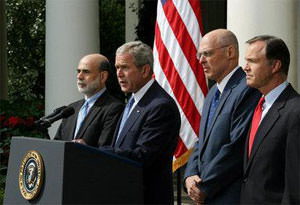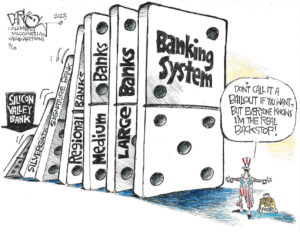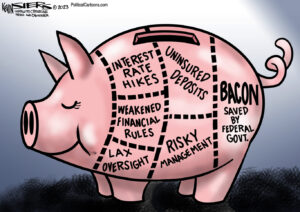Hustling Toward a Bailout Compromise
Following days of hype-work by the Bush administration to scare taxpayers into paying for Wall Street's failures, support for the $700-billion bailout seems to be gaining steam. Analysts believe the final bailout plan, expected in a day or two, may look eerily similar to Bush's initial proposal, with some slight changes.
Following days of hype-work by the Bush administration to scare taxpayers into paying for Wall Street’s failures, support for the $700-billion bailout seems to be gaining steam. Analysts believe the final bailout plan, expected in a day or two, may look eerily similar to Bush’s initial proposal, with some slight changes.
Your support matters…The Wall Street Journal:
A dramatic flurry of activity late Wednesday, including a prime-time address by President George W. Bush, appeared to galvanize efforts to finalize the administration’s $700 billion financial-markets bailout, despite continuing tensions and an occasionally heated debate on Capitol Hill.
Democratic leaders hope to nail down details of the measure early Thursday, ahead of an extraordinary summit meeting in the afternoon at the White House, which will bring together Republican and Democratic presidential nominees, along with Mr. Bush and top leaders from Congress.
Much is still uncertain and the contours of a likely bill could change. But the outlines of a potential compromise began to emerge late Wednesday after congressional leaders started considering restrictions on the bailout plan that could break the pool of money into installments.
Independent journalism is under threat and overshadowed by heavily funded mainstream media.
You can help level the playing field. Become a member.
Your tax-deductible contribution keeps us digging beneath the headlines to give you thought-provoking, investigative reporting and analysis that unearths what's really happening- without compromise.
Give today to support our courageous, independent journalists.




You need to be a supporter to comment.
There are currently no responses to this article.
Be the first to respond.